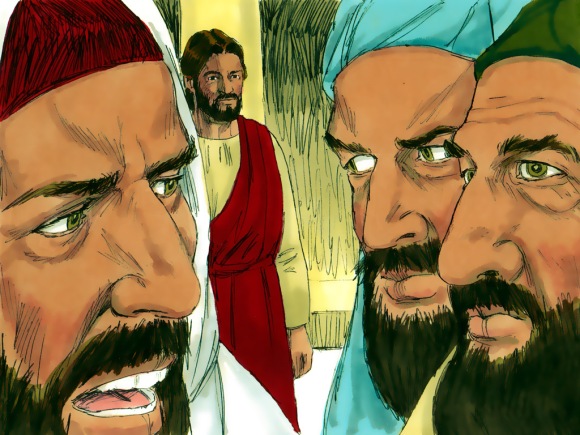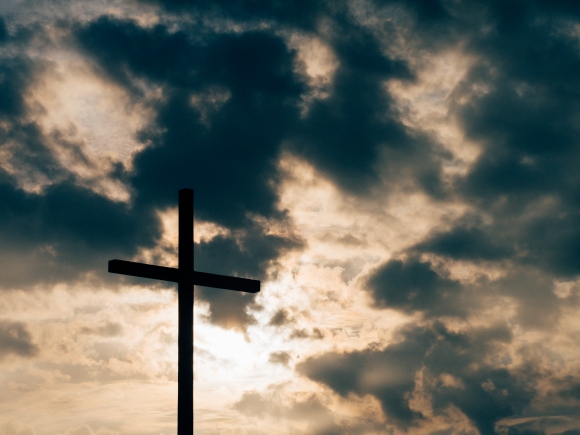
Image by Sweet Publishing/FreeBibleimages.org is licensed under CC BY-SA 3.0
Sometimes I feel bad for the Pharisees. Yes, they are the “bad guys” in the Gospels, and they do end up conspiring to kill Jesus, but when I read some of the Old Testament, I can’t help but feel a little sympathetic. I think if I had no access to the New Testament and I decided I wanted to obey God fully, I would probably have done it like them.
Take, for example, the Sabbath. If you are familiar with the Gospel stories, you will know that one of the things that enraged the Pharisees the most was Jesus working on the Sabbath. There is an often repeated pattern where Jesus heals someone on the Sabbath, the Pharisees confront him for breaking the law, Jesus says something offensive, and the Pharisees plot to kill him. To our compassionate eyes, we can’t help but wonder what is wrong with them. Can’t they see that Jesus is healing people? Why get all anal about the Sabbath when miracles are being done? But then I read Jeremiah 17. I’ll spare you the whole chapter, but let’s look at a few verses, starting with 21-23:
Thus says the Lord: Take care for the sake of your lives, and do not bear a burden on the Sabbath day or bring it in by the gates of Jerusalem. And do not carry a burden out of your houses on the Sabbath or do any work, but keep the Sabbath day holy, as I commanded your fathers. Yet they did not listen or incline their ear, but stiffened their neck, that they might not hear and receive instruction.
Ok, well that’s pretty explicit. But maybe it wasn’t that big of a deal. I wonder what would happen to people if they didn’t keep the Sabbath? Let’s check verse 27:
But if you do not listen to me, to keep the Sabbath day holy, and not to bear a burden and enter the gates of Jerusalem on the Sabbath day, then I will kindle a fire in its gates, and it shall devour the palaces of Jerusalem and shall not be quenched.
Yikes! So scripture VERY CLEARLY tells them to not do any work or carry any burdens on the Sabbath, unless they want their city destroyed by fire. Do you understand the Pharisees a bit better now? If I took those passages literally, had no other context of understanding, and saw Jesus doing his thing on the Sabbath, I’m pretty sure I would join with the Pharisees and ask Jesus, “can’t you do these things on another day?”
How did Jesus deal with the contradiction? In Matthew 12:11-12, he says,
Which one of you who has a sheep, if it falls into a pit on the Sabbath, will not take hold of it and lift it out? Of how much more value is a man than a sheep! So it is lawful to do good on the Sabbath.
And in Mark 2:27, Jesus says,
The Sabbath was made for man, not man for the Sabbath. So the Son of Man is lord even of the Sabbath.
This is powerful, and a complete departure from previous interpretations of scripture. Before, scripture was seen as the value holder, with people deriving their value from their obedience to what it taught. Jesus flips this concept on its head by restoring value to the person. If something has to bend, he would rather bend the law in order to love/help/heal a person than try to bend that persons needs around the commandment. That doesn’t mean that the old commandments are meaningless. But the reason that the commandments matter and the new lens through which we view them are rooted in the revelation that it is humanity that holds the greatest value in God’s heart.
Jesus never says the Sabbath is bad. He says that the Sabbath was made for man. While it was written down in commandment language, what if we revisited it with our new understanding? I think it would read something like this:
You work very hard, and your work is important. Especially when you are behind on what needs to be done, it can be easy to put everything aside and just keep working. But you mean so much more to me than what you do. I know it can be difficult to slow down, but I want you to make time and space for yourself to breathe. Rest in me. Remember my goodness. Enjoy your family. Recharge. Your work will still be there when you are finished, but you will be able to approach it with a new energy that will actually increase your productivity without enslaving you to the rat race. Trust me, I know what is good for you.
What do you think? If God’s primary focus is not the Sabbath, or the Law, or Scripture itself…if WE are the value holders that God is willing to bend heaven and earth to reconcile with himself, how does that change how we see ourselves? How does that change how we treat other people? How does that change how we read scripture? I would love to hear your thoughts!







